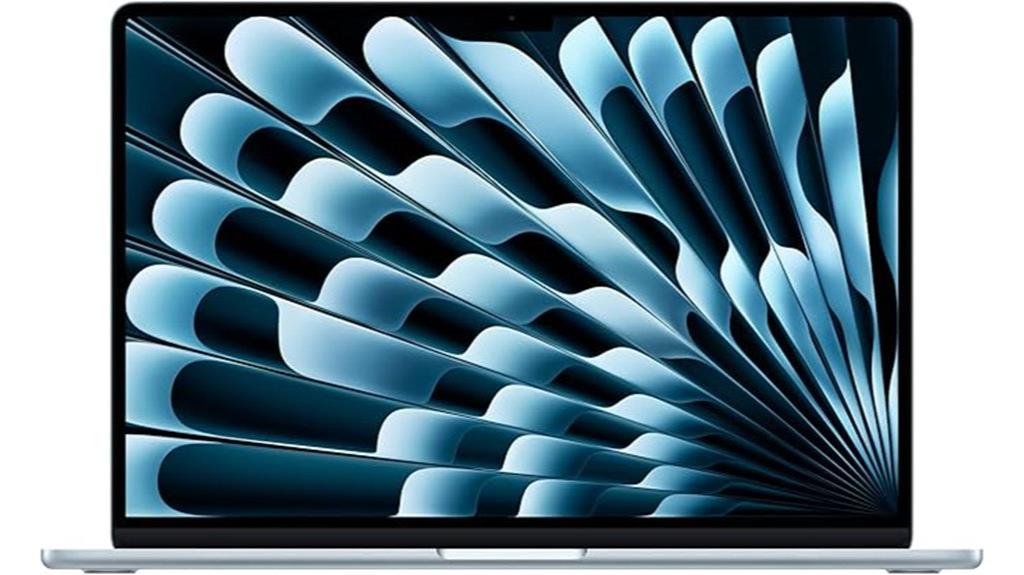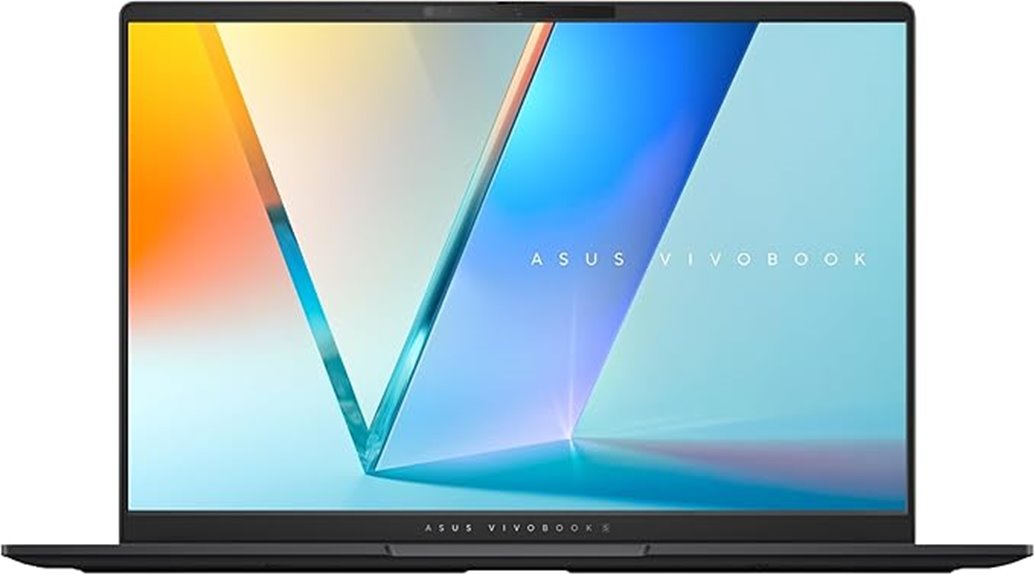Best Laptop for Pre Med Students (Top 5 Picks for 2025)
For pre-med students, you need a laptop that balances power and portability. The Apple 2024 MacBook Pro with M4 chip is perfect for multitasking, while the Acer Swift X 14 offers impressive performance in a lightweight design. The Apple 2025 MacBook Air combines performance with a sleek profile, and the ASUS Vivobook S 14 OLED enhances your visual experience. The Samsung Galaxy Book4 Pro is another solid choice for productivity on the go. Keep reading to discover more options tailored for your studies.
In the interest of full disclosure, we would like to inform you that some links on our website are affiliate links. By clicking on these links and completing a purchase from our partners, we may receive a nominal commission at no extra cost to you. Rest assured, our affiliate partnerships do not compromise the integrity of our editorial content or product evaluations. For further clarification, kindly refer to our comprehensive affiliate disclosure.
Table of Contents
What Are the Best Laptop for Pre Med Students to Buy This Year?
Here are my top picks for the best laptop for pre med students, you can consider this year.
Apple MacBook Pro Laptop with M4 Chip (14.2-inch Liquid Retina XDR Display)
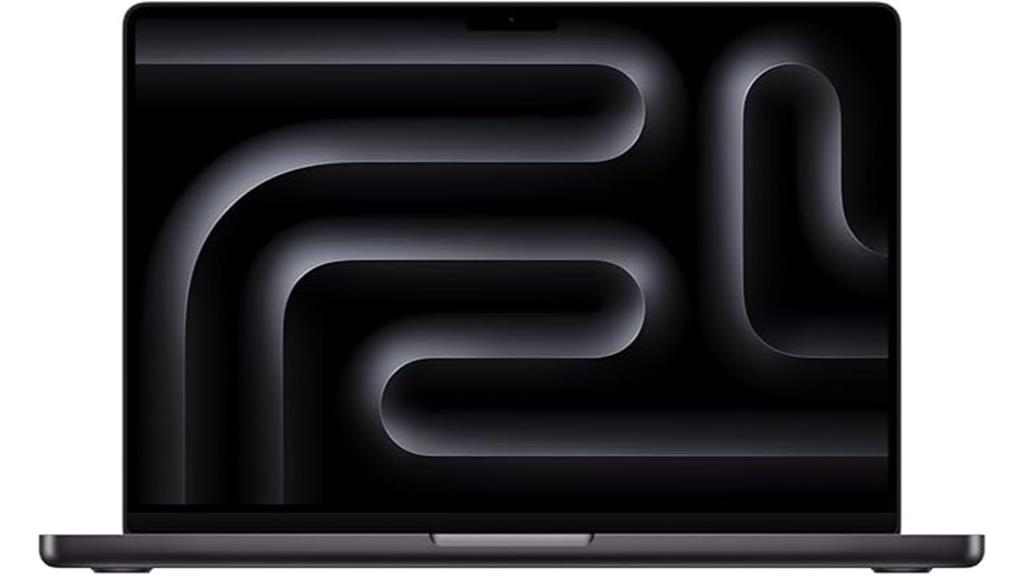
If you’re a pre-med student juggling intensive coursework and demanding study schedules, the Apple 2024 MacBook Pro with the M4 chip is an ideal choice. With its powerful 10-core CPU and GPU, you’ll experience exceptional speed for multitasking and running productivity apps. The 14.2-inch Liquid Retina XDR display offers stunning visuals, featuring 1600 nits peak brightness and a remarkable contrast ratio of 1,000,000:1. Plus, the all-day battery life ensures you stay productive, whether you’re in class or on the go. Seamlessly integrate with other Apple devices, enhancing your study experience with features like iPhone Mirroring and FaceTime.
Best For: Pre-med students and professionals seeking a powerful, portable laptop for intensive coursework and multitasking.
Pros:
- Exceptional performance with a 10-core M4 chip, ideal for running demanding applications.
- Stunning 14.2-inch Liquid Retina XDR display with high brightness and contrast, perfect for detailed visual work.
- All-day battery life ensures productivity without frequent recharging, great for busy schedules.
Cons:
- Higher price point compared to other laptops, which may be a consideration for budget-conscious students.
- Limited upgrade options for RAM and storage post-purchase, potentially restricting future needs.
- Some users may prefer a larger screen size for multitasking, which could be a drawback with the 14.2-inch display.
Acer Swift X 14 Laptop (SFX14-72G-77NJ)
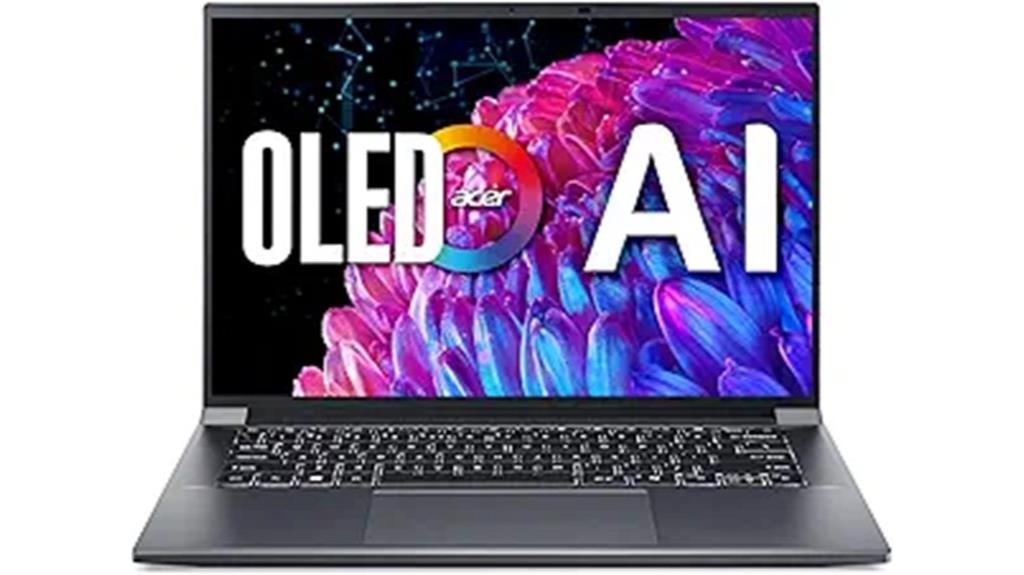
The Acer Swift X 14 Laptop (SFX14-72G-77NJ) stands out as an excellent choice for pre-med students who need powerful performance in a compact design. With an Intel Core Ultra 7 processor and NVIDIA GeForce RTX 4060 GPU, it handles demanding software effortlessly. The stunning 14.5-inch OLED display ensures vibrant visuals and reduced eye strain. Plus, the 16GB LPDDR5X memory and 1TB SSD give you ample storage and multitasking capabilities. Collaboration is seamless with the 1080p webcam and AI noise reduction. Its advanced connectivity options keep you connected, making it a perfect companion for your studies and future medical pursuits.
Best For: Pre-med students seeking a powerful, compact laptop that excels in performance and multitasking.
Pros:
- Powerful performance with Intel Core Ultra 7 processor and NVIDIA GeForce RTX 4060 GPU, ideal for demanding software.
- Stunning OLED display with vibrant visuals and TÜV Rheinland certification for reduced eye strain.
- Seamless collaboration features including a 1080p webcam and AI noise reduction for clear video calls.
Cons:
- Limited upgradeability due to compact design, making future hardware upgrades challenging.
- Higher price point compared to basic laptops, which may not be suitable for budget-conscious students.
- Potentially shorter battery life when running graphically intense applications or multitasking heavily.
Apple 2025 MacBook Air 15-inch Laptop with M4 Chip

For pre-med students balancing rigorous coursework and demanding study schedules, the Apple 2025 MacBook Air 15-inch with the M4 chip stands out as an exceptional choice. Its powerful M4 chip ensures smooth multitasking and impressive performance for video editing and gaming. With up to 18 hours of battery life, you can study all day without worrying about recharging. The stunning 15.3-inch Liquid Retina display brings your notes and images to life with vibrant colors. Plus, the 12MP Center Stage camera and high-quality audio make virtual lectures enjoyable. With robust privacy protections, your data remains secure while you excel in your studies.
Best For: Pre-med students who need a powerful, portable laptop for multitasking and studying on the go.
Pros:
- Enhanced Performance: The M4 chip allows for fluid multitasking, making it ideal for video editing and gaming.
- Long Battery Life: Up to 18 hours of battery life enables all-day studying without frequent recharging.
- High-Quality Display and Audio: The 15.3-inch Liquid Retina display and advanced audio features enhance the experience of virtual lectures and multimedia content.
Cons:
- Limited Ports: Only two Thunderbolt 4 ports may be insufficient for users needing multiple connections.
- Price Point: As a premium device, it may be more expensive compared to other laptops targeting students.
- Weight: While portable, the 15-inch size may be slightly heavier than smaller models, which could be a consideration for on-the-go use.
ASUS Vivobook S 14 OLED Slim Laptop (M5406WA-DS76)
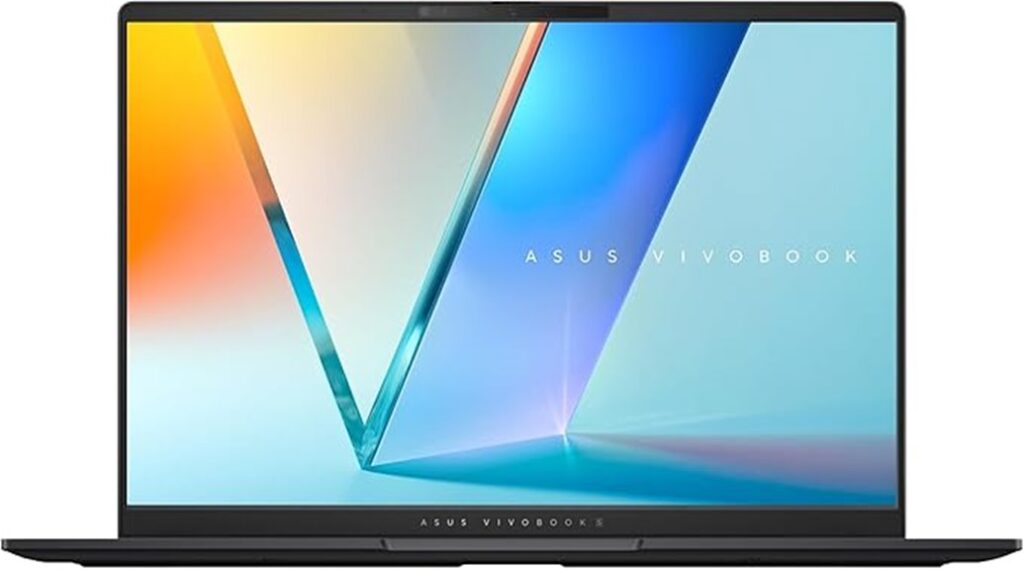
Looking for a laptop that can handle the demanding workload of pre-med studies? The ASUS Vivobook S 14 OLED Slim Laptop (M5406WA-DS76) is an excellent choice. Powered by an AMD Ryzen 9 365 processor and 24GB of RAM, it ensures smooth multitasking. The stunning 14” 3K OLED display provides vibrant visuals, ideal for studying complex diagrams. Weighing just 2.87 lbs and slim at 0.63”, it’s easy to carry. Plus, with customizable RGB backlighting and multiple connectivity options, it fits seamlessly into your study routine. This laptop balances performance and portability, making it a perfect companion for your academic journey.
Best For: Students in demanding fields like pre-med who require a powerful, portable laptop for multitasking and studying.
Pros:
- High performance with AMD Ryzen 9 365 processor and 24GB of RAM for seamless multitasking.
- Stunning OLED display with 3K resolution and 600nits brightness, ideal for detailed study materials.
- Lightweight and slim design makes it easy to carry around campus.
Cons:
- Limited storage with only 512GB SSD, which may require external storage for larger files.
- No dedicated graphics card, which might affect performance in graphics-intensive applications.
- RGB keyboard may not appeal to all users who prefer a more traditional look.
Samsung Galaxy Book4 Pro Business Laptop (NP944XGK-KG4US)
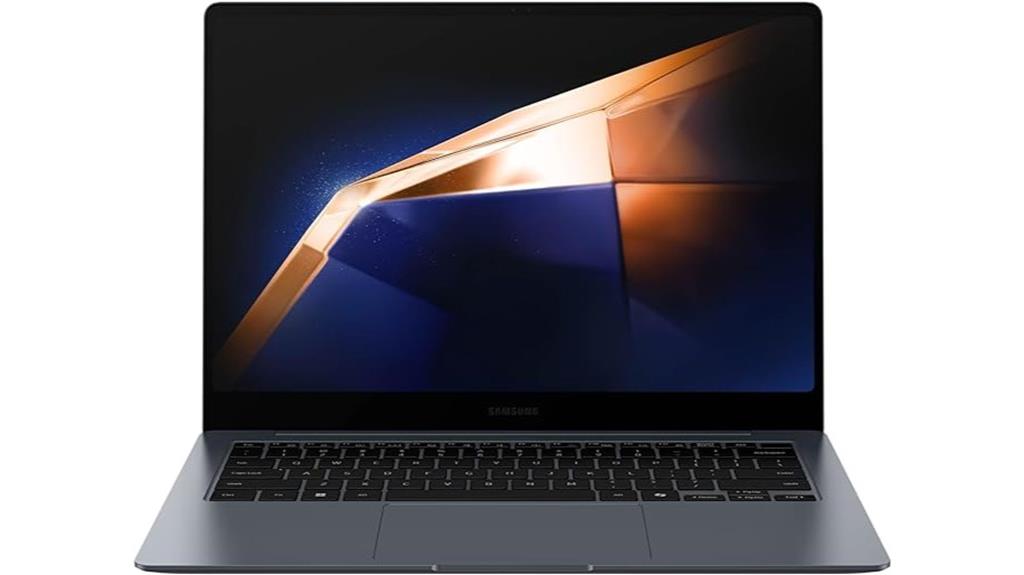
With its powerful Intel Core Ultra 7 processor and 32GB of RAM, the Samsung Galaxy Book4 Pro Business Laptop (NP944XGK-KG4US) stands out as an ideal choice for pre-med students. Weighing just 2.71 lbs, it’s incredibly portable, perfect for your busy lifestyle. The stunning 14-inch 3K AMOLED touchscreen ensures you can study or present with clarity, even in bright settings. You’ll appreciate the fast charging capability and solid battery life, allowing for seamless multitasking. Plus, with robust security features like Samsung Knox, your sensitive data remains safe. This laptop truly balances performance and convenience for your rigorous academic demands.
Best For: The Samsung Galaxy Book4 Pro is best for pre-med students seeking a powerful, portable laptop for multitasking and presentations.
Pros:
- Exceptional performance with Intel Core Ultra 7 processor and 32GB RAM, ideal for demanding applications.
- Lightweight design at 2.71 lbs, making it easy to carry around campus.
- Stunning 14-inch 3K AMOLED touchscreen provides excellent clarity for studying and presentations.
Cons:
- High retail price of $1749 may be a barrier for some students compared to competitors.
- Limited RAM upgrade options in certain regions, maxing out at 16GB.
- Perceived low quality of the OEM SSD from Western Digital for the price point.
ALSO READ: Best Laptop for Genealogy Research, Best Laptop for Freelancers , Best Laptops for Movies, Best Laptop for Excel Modeling, Best Laptop for Webcam Modeling, Best Laptops for Coding and Programming, Best Laptop for Architect, Best Laptop for Chemical Engineering Students, Best Laptop for Drone Mapping, Best Laptop for Automotive Programming
Factors to Consider When Choosing the Best Laptop for Pre Med Students
When you’re choosing a laptop as a pre-med student, several factors can make a big difference in your experience. You’ll want to consider performance and speed for handling demanding applications, along with display quality for clarity during long study sessions. Don’t forget about battery life, portability, and connectivity options to ensure you can study effectively wherever you are.
Performance and Speed
To excel in the demanding field of pre-med studies, you need a laptop that delivers top-notch performance and speed. Look for a high-performance processor, like a multi-core CPU, to efficiently run demanding applications and multitask during your studies. Ample RAM—ideally 16GB or more—ensures smooth multitasking and quick access to complex medical software. Fast SSD storage is crucial for enhancing loading times, improving overall system responsiveness and productivity. Don’t overlook battery life; aim for a laptop that offers at least 8 hours of use on a single charge to support long study sessions without interruption. With these features, you’ll be well-equipped to tackle the challenges of your pre-med coursework.
Display Quality
Studying medicine requires not just speed and performance but also a display that enhances your learning experience. A high-resolution display, like 2880 x 1800, gives you the sharp detail needed to review intricate diagrams and images in textbooks. Look for displays with a peak brightness of 600 nits or higher to ensure readability in bright environments. OLED technology can also be a game-changer, offering vibrant colors and deeper contrasts that reduce eye strain during those long study sessions. A high refresh rate of 120Hz improves scroll smoothness, making navigation through digital materials effortless. Lastly, an aspect ratio of 16:10 increases vertical viewing area, allowing you to multitask effectively by displaying more content simultaneously.
Battery Life
Battery life plays a crucial role in your daily routine as a pre-med student, especially with the long hours spent in classes and studying. You need a laptop that can last throughout the day, ideally up to 18 hours on a single charge. This ensures you can manage extensive note-taking, research, and assignments without constantly searching for an outlet. Opt for laptops with fast charging capabilities, allowing you to quickly recharge during short breaks. It’s also important to choose models that maintain performance while on battery power, so you can run demanding applications needed for your coursework. Lastly, keep in mind that lighter laptops are often more energy-efficient, making them perfect for your busy, on-the-go lifestyle.
Portability and Weight
Portability and weight are essential factors for pre-med students who juggle classes, labs, and study sessions. You’ll want a laptop that’s lightweight, ideally under 3.5 lbs, making it easy to carry around campus. A slim profile of about 0.6 inches or less ensures it fits comfortably in your backpack without taking up too much space. Battery life is also crucial; look for laptops that provide at least 8-10 hours on a single charge, so you can work all day without searching for an outlet. Fast charging capabilities can help you quickly recharge between classes, minimizing downtime. Finally, choose a laptop with a durable design to withstand daily wear and tear, keeping it functional as you move from place to place.
Connectivity Options
When selecting a laptop for your pre-med journey, connectivity options play a crucial role in your daily workflow. You’ll want a laptop with multiple USB-C ports for both charging and data transfer, ensuring compatibility with various medical devices and peripherals. A minimum of two USB ports is ideal, allowing you to connect external drives, mice, or other accessories simultaneously. An HDMI port can be beneficial for presentations or connecting to projectors during group studies or lectures. Additionally, a microSD card reader simplifies transferring files from digital devices like cameras, useful for documenting clinical experiences. Finally, advanced wireless connectivity like Wi-Fi 6E offers faster internet access, essential for online research and telehealth applications.
Software Compatibility
Choosing the right laptop isn’t just about hardware; it’s also vital to ensure that your device can run the software you’ll need throughout your pre-med journey. You’ll likely require medical imaging tools, statistical analysis programs, and electronic health record systems, so compatibility with specific operating systems is crucial. Popular applications like Microsoft 365 must run smoothly to keep your workflow efficient. Additionally, cloud-based applications are beneficial for easy access to resources and collaboration with peers. High-performance laptops that support specialized software can enhance your learning experience significantly. Lastly, consider how well your laptop integrates with other devices, like tablets or smartphones, to create a seamless study and research environment.
Build Quality
While software compatibility lays the groundwork for a productive pre-med journey, the build quality of your laptop plays a significant role in its overall functionality and longevity. As you carry your laptop between classes and labs, a sturdy chassis is essential to withstand daily wear and tear. Opt for lighter, slimmer models that fit easily in your backpack during those long campus days. The quality of the keyboard and trackpad also matters; you’ll want a comfortable input system for those marathon study sessions. Good thermal management helps prevent overheating during intensive tasks, ensuring consistent performance. Lastly, a high-quality display with good brightness and color accuracy can reduce eye strain, making your studies more enjoyable and effective.
Price and Value
Price and value are crucial considerations for pre-med students selecting a laptop. You’ll want to find a balance between performance and cost; a capable device can boost your productivity during demanding studies. Evaluate warranty and support options, as pricier laptops often come with better customer service and extended warranties, giving you peace of mind. Additionally, consider resale value; models that hold their worth can help reduce overall ownership costs, especially on a budget. Don’t forget to check for student discounts and financing options to lower your upfront expenses. Lastly, prioritize laptops with solid battery life, so you won’t constantly search for a charger during long study sessions or classes, enhancing your overall investment.
Frequently Asked Questions
What Operating System Is Best for Pre-Med Students?
When choosing an operating system, consider what software you’ll need. Windows is widely compatible with medical programs, while macOS offers a user-friendly experience. Both systems have their strengths, so pick the one that suits you best.
How Much RAM Do Pre-Med Laptops Need?
For pre-med laptops, you’ll want at least 8GB of RAM for smooth multitasking. If you can swing it, 16GB offers better performance for demanding tasks, like running simulations or managing large datasets efficiently.
Are Touchscreens Beneficial for Medical Studies?
Touchscreens can enhance your medical studies by allowing easier note-taking, interactive learning, and quick access to resources. You’ll find them beneficial for engaging with applications and digital textbooks, making study sessions more efficient and enjoyable.
Should I Prioritize Battery Life or Performance?
You should prioritize battery life if you often study on the go. However, if you need intensive performance for software or multitasking, then go for power. Balance both based on your unique study habits and requirements.
Can I Use a Tablet Instead of a Laptop?
You can use a tablet instead of a laptop, but it depends on your needs. If you require powerful apps or multitasking capabilities, a laptop might be the better choice for efficiency and performance.
My Final Opinion
Choosing the right laptop as a pre-med student is crucial for balancing power and portability. Whether you opt for the sleek Apple MacBook Pro or the versatile Acer Swift X, each option offers unique features to support your studies. Don’t forget to consider factors like battery life, weight, and processing speed to match your academic needs. With the right laptop, you’ll be well-equipped to tackle your coursework and excel in your medical journey.
